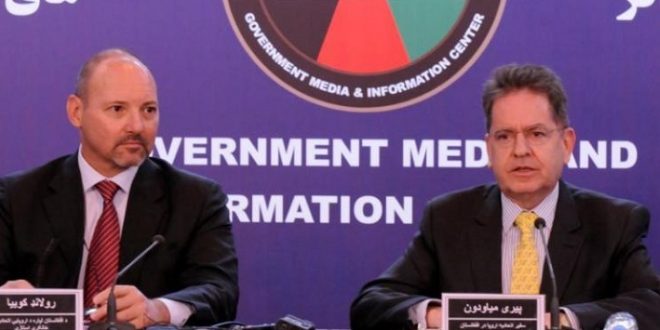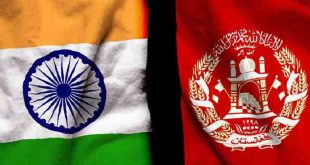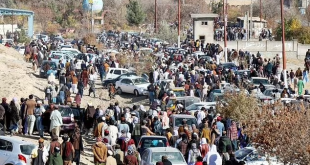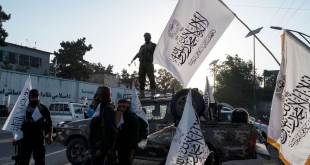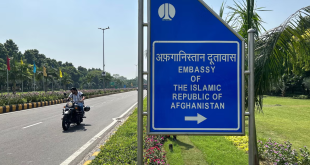AT News Report
KABUL: European Union Special Envoy for Afghanistan Roland Kobia has insisted for resumption of peace dialogue between the U.S and the Taliban with immediate start of Intra-Afghan talks to be accompanied by a comprehensive ceasefire.
Speaking at a press conference here in Kabul, Kobia expressed sadness over pause of the peace talks, saying “we are very much hope and are working with our partners” in directions to try to resume the talks, and finish it with entering to the next stage, which is the intra-Afghan negotiations.
He said: “We were very pleased about the fact that there was a dialogue between the US and the Taliban and the EU has been supporting this dialogue, because we always thought it was a necessary first step”, the US-Taliban bilateral negotiations “and they should open the way for the real peace process between the Afghans to start, so we were sad in a way to see that these talks have been stalled and we very much hope and we are working with our partners in that directions to try to resume the talks and enter to the next stage.”
He stated that to take a fresh look at maybe the format but also the contents of what was around to this agreement. “What the EU is advocating and proposing is try to add a ceasefire, I think it is the right moment and the right opportunity to go one step beyond simple reduction of violence and explore the ways in which ceasefire and cessation of hostilities, temporary ceasefire would take place.”
He elaborates that “the idea is really to see how we can move the ceasefire idea forward, instead of leaving it for later. The other point has been the opportunity to revisit the way the negotiations are held, the EU has always pleaded for centrality of the government of Afghanistan.”
He asserted that “we believe the Afghan peace process should be Afghan-owned and Afghan-led. And let’s ensure that the process is really in the hands of the Afghan government with strong help and support of the international community.”
Mr. Kobia continued that they would like to see a very swift resumption of the negotiations between the Taliban and the Americans and the start of the negotiation between the government and the Taliban in that inclusive way and with teams that reflect the different political forces of the country, so that they have an inclusive team on both sides.
He said that the third point was about how do we look at the past and how do we look at the future, Afghanistan has come a long way in the past 18 years. “I think this is recognized by everyone, except a few, and the EU has consistently been promoting the idea that Afghanistan need to look to the future not to the past, Afghanistan need to move forward and the sacrifices that have been made, the bloods that have been spelled by Afghans, by the international community should not have been made in vain and let me also say the blood that has been spelled by the Taliban because they are also human being and Afghans and they have also sacrificed things, so together you (Afghan) need to move forward, but need to move forward in a way that does not erode what Afghanistan have achieved over the last 18 years.”
In many different matters, social issues, political issues and off cores the protection of more venerable groups, woman, youth, minorities all these groups and all these citizens represents an important part of the population and bringing them together in a process will ensure that the peace agreement whatever it is in the future will ensure that this agreement will be lasting that it will be accepted by the Afghan population and this why the EU had also proposed in order to try help Afghanistan and Afghans to protect these gains to be a guarantor of a peace agreement not the of process itself, he noted.
EU envoy said, “my fourth point is on the rules of engagement, the international community has tried over the years to support Afghanistan the best what we have could, we have not been perfect we have made our mistakes, but on the part of the EU its members states that have been extremely active in Afghanistan, there was a very strong willingness to do well and we want stand with Afghanistan, we want to continue supporting Afghanistan in the future, so do not think that if there is a peace agreement international partners will leave, we remain committed to support reconstruction in Afghanistan the future development the trade, the connectivity with the regional countries.”
“We try to faster not peaceful environment, but also prosperous environment, where finally the two large part of the population that lives in poverty can have better lives, but off cores for that there are some principals that needed to be there for European partners and I would say the most probably all western partners to be able to help Afghanistan,” he added.
He stated that this is the fact that the country would need to continue on the part where the political governance is fit for the western countries to be able to work with the future government whatever it is, coalition government, “so I am telling about the government after the peace agreement” where the Taliban maybe participate to power, so if it would be a form of government which does not respect fundamental values, fundamental rights, that does not set up a system, where “we can actually work,” if it would be an Islamic emirates where these rights would not be protected it would make it very difficult for Europeans to help the reconstruction to provide development aid to give access to the first world market, which is the EU.
 Afghanistan Times
Afghanistan Times
